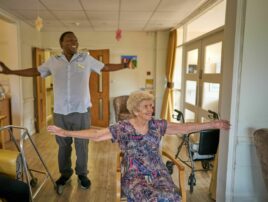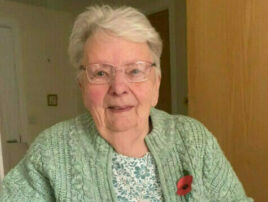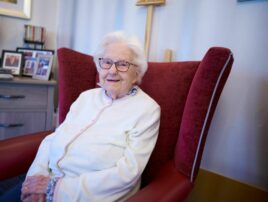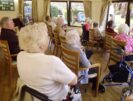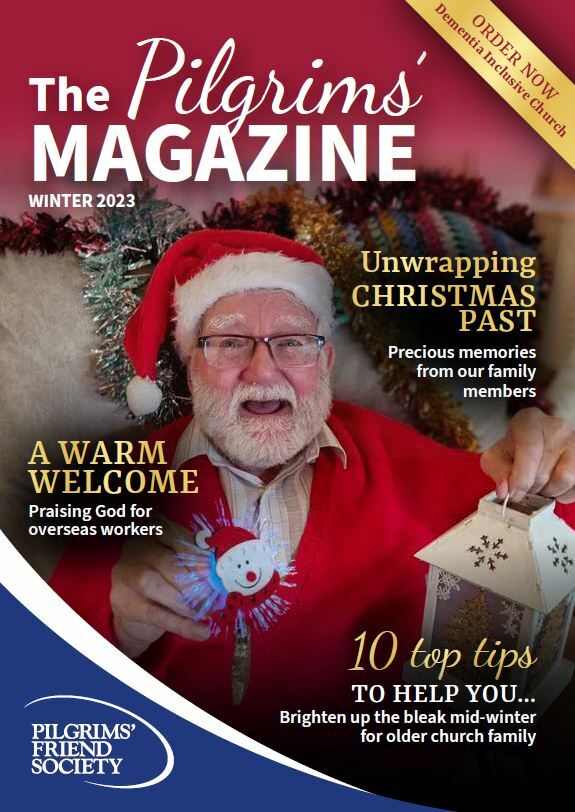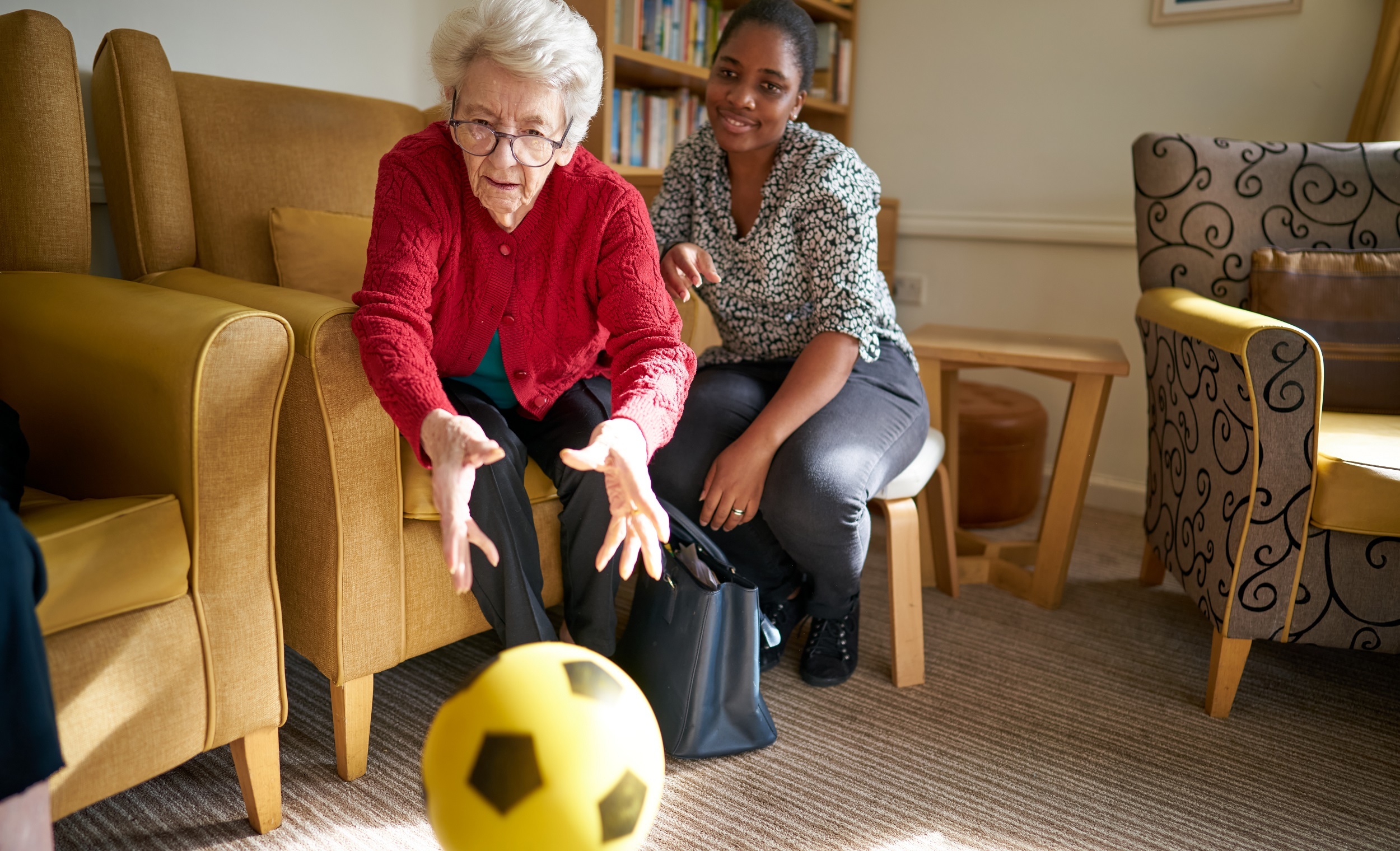
Friday 24th November 2023
Overseas sponsorship
How sponsoring care workers from overseas is helping us to address staff shortages and enrich life in our homes
In February 2022 the Government added ‘care workers’ and ‘home carers’ to its shortage occupation list for skilled workers. This has meant that social care providers like Pilgrims’ Friend Society can sponsor care workers from abroad. This has helped us fill our vacancies, ensuring our family members are supported in the best way possible.
Recruiting permanent members to our teams helps us to reduce our reliance on agency staff, which is very costly. In the past year, our vacancy rate has dropped from 10% to 2.1% (1200 hours per week covered by agency staff is now down to 249 hours).
Sponsoring a worker from overseas entails considerable investment too – for every person we recruit, we pay £2,000 to the Government for a Certificate of Sponsorship. But we know that our staff are our greatest asset, worth investing in, and when a staff member stays long-term the investment pays off. Our aim is that every overseas worker we recruit will stay for at least five years.
Given the need for commitment, we put a lot of care into the selection stage, ensuring the role is the right fit. We may hear about potential applicants by word-of-mouth from our existing staff network. We are also open to speculative applications and take a case-by-case approach.
The first step is for a candidate to complete their application form online. We then invite a shortlist for an interview with our overseas recruitment panel via video call, made up of managers and our HR team. At interview stage, we don’t always know which home the person will end up working in, but where we do we’ll invite the manager of that home to be there.
The interview process gives us a sense of whether the candidate has the necessary skills to work with us and is a good fit for the vision and values of our organisation. Once we have made an offer, we ensure that all the background checks are done and start applying for their Certificate of Sponsorship, a process which can be lengthy.
So far, we’ve had 19 overseas workers join our staff teams, and (at time of writing) a further 10 or 11 are waiting to be sponsored. We’ve found this to be a positive experience. Many of those who have joined us come from cultures where older people are respected. They understand the value and importance of care.
The story of Timothy and Sami at Luff House in Walton-on-the- Naze shows how well overseas sponsorship can work:
Timothy Agbenike, Registered Care Manager at Luff House
Before we took on workers from overseas we were very short of staff. We have some wonderful carers on our team but we’re situated in an area with a high older population and few people of working age.
Many of our carers have young families and would find it difficult to cover night shifts. Luff House is most easily reached by car, which of course not everyone has, so recruitment can be a challenge. Due to staff shortages, we were spending a lot of money on agency staff fees. Not only is this expensive, it also doesn’t allow for the same continuity of care that is so important for our family members.
I’ll admit, when I first heard about overseas sponsorship I had some reservations. I wondered if there would be issues around language and I was aware whoever came would have to learn a new system of care.
However, if you don’t try something then you can’t know whether it will work so I was willing to give it a go. The video interview was very helpful. I could get a sense of a candidate’s suitability for the role. I not only got a feel for their language skills but also gained an understanding of their motivation. We ended up recruiting three overseas workers through this interview round. What came across strongly was the respect and concern they had for older people, something which is embedded in their culture – they just got it.

Another thing that helped is that these candidates had been recommended to us by PumDim Skinner, the Registered Care Manager of our home in Framland, Wantage. Two are siblings and one is a friend. Before they started with us, they stayed with PumDim and had an induction at Framland. This meant they arrived with a sense of how things are done. They also completed their The Way We Care training early on.
One thing I’ve been very struck by is the willingness of these new staff members to learn and grow. To help them settle in, I looked carefully at my existing staff team to see who would be best to support them through a buddy system. I also made sure we didn’t rush and checked in with them frequently in their first days.
Having these new staff has helped us enormously. This time a year ago we were giving 400 hours to agency staff every week. Now that’s much reduced. Our agency spend has halved. This means we can use our budget for other things and as a home we feel much more settled. We have the continuity and consistency that supports the well-being of the family members. It has been a big success.
To receive your copy of the magazine FREE four times a year, sign up now.
Sami, 18, Care Assistant from Myanmar
I have been made to feel very welcome at Luff House – it’s like a family. As a team, we help each other out. The family members always tell me how much they appreciate my help. They say, ‘you are so kind.’ Or they might just smile – their smile is their truth in their heart.
There is one lady, Peggy, who I have got to know well. She always asks me about my family and is interested in my life. She likes to tell me about her grandchildren.
It helps that I am living with two friends from Myanmar who are also working at Luff House. We can talk about work together and share ideas on how we can best support the family members.
One of the main challenges I have had is with language. I don’t always get things straight away. The team are very patient. Looking at body language can help a lot. Every weekend I do English classes on Zoom to help me improve.
The weather is also something I’m getting used to. In my country, it is usually around 39 or 40 degrees Celsius. Here, when I wake up at 5am to do my shift it is very cold. I leave the house wearing a heavy coat.
I am lucky as my home is only a 10-minute walk from the beach. I love the sea and when I need to relax I go for a walk along the beach.

Birthdays are important here. The cook at Luff House is very good and always makes a cake for the family member whose birthday it is. My birthday is coming up soon and I plan to bring in a cake and some candy so that I can celebrate with the home.
I’m interested to learn about how care is done here. In Myanmar, I volunteered in a care home. In the long term, I’d like to study at university, possibly business management.
Please pray:
Thank you God for all the brilliant staff who have joined us from overseas.
If you are interested in joining our team as an overseas worker, or if you know someone who would be a good fit, please email recruitment@pilgrimsfriend.org.uk
Find out more about working with Pilgrims' Friend Society

Meet a The Way We Care Lead... Jenny
Jenny joined the team at Evington Home in Leicester as our The Way We Care Lead, overseeing our bespoke approach to care at the home

Life in our homes... Sylwia, Senior Carer, at Emmaus House
Sylwia is a Senior Carer and Care Team Leader at Emmaus House, our home in Harrogate. She told us all about her passion for care


